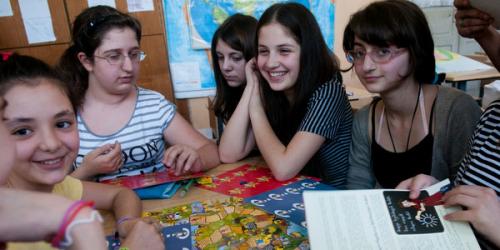On International Day for Disaster Reduction, UN highlights key role of women and girls
Marking the International Day for Disaster Reduction, United Nations officials have called for women and girls to be at the forefront of reducing risk and managing the world's response to natural hazards.

Women and girls must participate in poverty reduction, climate change adaptation and disaster risk reduction that will shape their future and those of their families and communities.
“Across the world, women and girls are using their roles within families and communities to strengthen risk reduction,” said Secretary-General Ban Ki-moon in his message for the Day, which falls on 13 October.
The General Assembly designated 13 October as the International Day for Disaster Reduction in 2009, replacing an earlier version of the Day. Its objective is to raise awareness of how people are taking action to reduce their risk to disasters.
The theme of for this year's Day is 'Women and Girls: the [in]Visible Force of Resilience' – an estimated 200 million young people are affected by reported disasters each year and thousands of them are killed and injured.
In his message, Mr. Ban stressed that women's leadership in this area is increasingly valuable as climate change intensifies and the world struggles to cope with extreme weather.
“In Bangladesh, women organized themselves to prepare for and respond to floods by teaching other women how to build portable clay ovens and elevate houses,” Mr. Ban said. “In South Africa, marginalized adolescent girls have been empowered to help design plans to reduce the impact of drought and severe wind storms.”
The Secretary-General also noted that women and girls are a force of resilience and that encouraging them to take on leadership roles on disaster risk reduction will benefit entire communities.
“The best disaster recovery programmes in the world involve women who have survived such events. If we are to build true disaster resilience we need to put the emphasis on their greater involvement before disasters strike,” said Margareta Wahlström, the Head of the UN Office for Disaster Risk Reduction (UNISDR), the part of the UN responsible for the issue, as well as the secretariat of the International Strategy for Disaster Reduction.
Ms. Wahlström added that women's efforts to build resilience to disasters often go unrecognized, and the Day would help raise awareness of their key role in communities where they are many times in charge of decisions such as securing food, water and energy.
In her message for the Day, the Director-General of the UN Educational, Scientific and Cultural Organization (UNESCO), Irina Bokova, emphasized that women are “disproportionately affected by disasters because of social roles, discrimination and poverty,” and recalled that a gender perspective had been integrated into the design and implementation of all disaster reduction policy in the “Rio+20 Outcome Document” of the United Nations Conference on Sustainable Development, which was held in Rio de Janeiro, Brazil, this year.
“Discrimination is a violation of human rights – it is also bad policy,” she said, adding that women should not be discriminated and instead must be “powerful agents of change,” to ensure a sustainable future.
“This is why we are committed to empowering girls and women through education – to allow them to take charge of their lives and those of their families and communities,” Ms. Bokova said. “Women must participate fully in planning and implementing all disaster risk reduction measures.”
To this end, UNESCO's Global Partnership on Women and Girls' Education has been training young women in disaster-prone countries such as Haiti, Myanmar, Pakistan and Indonesia on how to reduce their vulnerability to disasters and increase their resilience, the cultural agency's chief added.
A wide range of events are taking place around the world this week to mark the Day, including tsunami drills in Myanmar, a workshop on gender-based violence in Vanuatu, community work in Rwanda, a poster and essay contest in the Philippines, a panel discussion at George Washington University in the United States, an education seminar in Nicaragua, and a seismic risk discussion in Greece, among others.
Source: UN News
- 387 reads
Human Rights
Ringing FOWPAL’s Peace Bell for the World:Nobel Peace Prize Laureates’ Visions and Actions

Protecting the World’s Cultural Diversity for a Sustainable Future

The Peace Bell Resonates at the 27th Eurasian Economic Summit

Declaration of World Day of the Power of Hope Endorsed by People in 158 Nations

Puppet Show I International Friendship Day 2020

